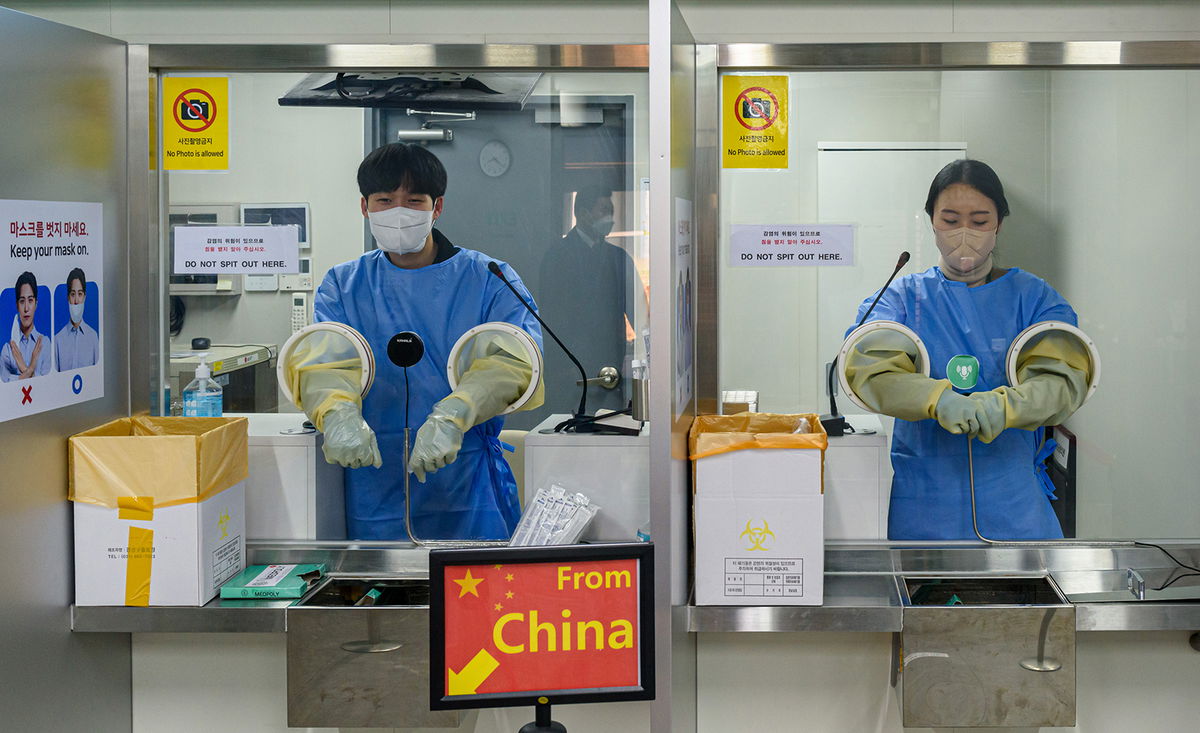China stops issuing some visas for South Koreans, Japanese in retaliation for travel restrictions

South Korean quarantine officials seen preparing PCR tests for travelers arriving from China at the Incheon International Airport near Seoul.
By Simone McCarthy and Wayne Chang, CNN
Chinese authorities have stopped issuing certain visas to South Korean and Japanese citizens as Beijing retaliates against recent Covid entry restrictions on arrivals from China.
“Visas for business, tourism, medical treatment, transit and general private affairs will be suspended for South Korean citizens effective today,” the Chinese Embassy in Seoul said in a statement on Tuesday. The measures will be “adjusted” if South Korea cancels its “discriminatory” entry restrictions on China, the embassy added.
The Chinese embassy in Tokyo later that day said it would suspend issuing ordinary visas to Japanese citizens, with resumption of the service to be “notified in the future.”
The restrictions mark China’s first retaliation against restrictions and screenings placed on travelers from China. A number of countries moved to require testing from travelers from China in recent weeks, citing concerns over the country’s recent surge of infections — and limited data about the outbreak — after Beijing dropped its stringent Covid controls last month.
South Korea went a step further on January 2 by suspending short-term visa applications from its consulates in China until the end of the month. It also requires people traveling from China to take a PCR test within 24 hours of arrival and remain in isolation until receiving negative results.
From January 5, it has also asked people traveling from China to present a negative PCR test taken within 48 hours of departure or a rapid antigen test taken within 24 hours.
Since last Saturday, South Korea has also required people traveling from Hong Kong and Macao to show proof of a negative Covid-19 test result — either from a PCR test taken within 48 hours before departure, or a rapid antigen test taken within 24 hours before traveling.
Japan initiated on-arrival testing requirements for all people who have traveled from or were in mainland China in the previous seven days on December 30, with anyone who tests positive being required to quarantine for seven days and undergo further testing.
On Monday, the government also announced that from January 12 all travelers coming from the Chinese territory of Macau by direct flight would be required to submit a negative Covid-19 test result conducted within 72 hours of departure and take a Covid-19 test on arrival.
Diplomatic spat
China’s move follows a Monday phone call between Foreign Minister Qin Gang and his South Korean counterpart Park Jin, during which Qin “expressed concern” over the restrictions and urged Seoul to take an “objective and scientific” approach, according to a readout from the Chinese side.
Both countries made official comments on the situation during regular briefings Tuesday, with the South Korean side saying their Covid-related restrictions on travelers from China were “based on scientific and objective grounds.”
South Korea’s Foreign Affairs Ministry spokesman Lim Soo-suk said the government had been “transparently sharing relevant information with the international community, and has continued to communicate with the Chinese side.”
China’s Foreign Ministry spokesman Wang Wenbin echoed China’s previous language, saying the country “resolutely objects” to “discriminatory” entry restrictions imposed on Chinese travelers and “will take proportionate countermeasures.”
“A few countries, with disregard toward scientific facts and actual epidemic situation in China, continued on imposing discriminatory entry restrictions … We call on these countries to come up with appropriate pandemic control measures based on facts and science, not engage in political manipulation, discriminatory measures, and impact normal personnel exchange and cooperation,” he said.
Japanese Foreign Minister Yoshimasa Hayashi also protested against China’s decision, saying Tokyo had requested through diplomatic channels that Beijing repeal the move.
“It is extremely regrettable that China decided to restrict issuing (visas) for reasons besides Covid-19 countermeasures,” Hayashi — who is on a diplomatic trip across the Americas — told reporters in Argentina on Tuesday.
Variant concerns
The move comes just days after China significantly eased strict border controls that had required all entrants to the country, whether Chinese nationals or eligible foreign nationals, to undergo multiple Covid-19 tests and mandatory hotel quarantine.
In recent weeks, more than a dozen countries including the United States, France, Canada, Japan and Australia have mandated Covid-19 testing for travelers from China, citing concerns about the level of data reporting from the country and the potential for new variants of the virus to emerge there. No such variants have yet been reported.
Some health experts around the world have also criticized targeted travel screening as ineffective and voiced concern such measures could fuel racism and xenophobia.
Top global health officials on Tuesday repeated calls for China — as well as the rest of the world — to provide details about the circulating coronavirus sequences.
“We need more sequences to be shared on publicly available databases like GISAID so that there can be an analysis by experts around the world,” Maria Van Kerkhove, the World Health Organization’s technical lead on Covid-19, said at a regular briefing.
She noted that many of the “high-income countries” that have been “critical” of China also need to share sequences in order for the scientific community to be able to track the coronavirus.
The-CNN-Wire
™ & © 2023 Cable News Network, Inc., a Warner Bros. Discovery Company. All rights reserved.
CNN’s Steven Jiang in Beijing, Emiko Jozuka in Tokyo, Yoonjung Seo and Gawon Bae in Seoul contributed reporting.

